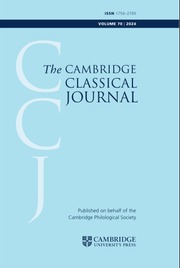No CrossRef data available.
Article contents
LUCRETIUS 5.1442 PROPTER ODORES: THE SWEET SMELL OF (VERY BELATED) SUCCESS?
Published online by Cambridge University Press: 09 June 2015
Abstract
This paper offers a new reading of the end of Lucretius 5.1442, arguing that the line-end as we have it (much less Servius’ apparent reference to it) cannot stand, but that the original reading may yet be recovered from the transmitted text. The paper also seeks to show how the corruption may have arisen.
- Type
- Research Article
- Information
- Copyright
- Copyright © The Author(s) 2015. Published by Cambridge University Press
Footnotes
IN MEMORIAM Professor David West




